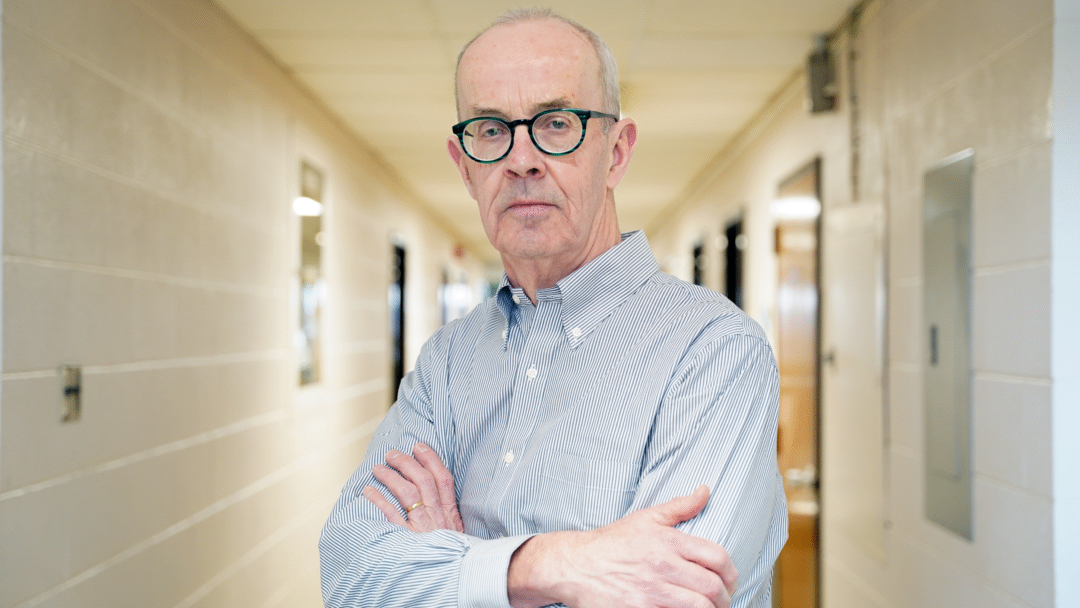Introducing Stephen Jones, acting academic director of Wilson College

McMaster’s Wilson College has appointed professor emeritus Stephen Jones as the acting academic director of Wilson College of Leadership and Civic Engagement.
Wilson College welcomes its first cohort of full-time undergraduate students in September. A partnership between the Faculty of Social Sciences and the Faculty of Humanities, it is home to Canada’s only combined honours Bachelor of Arts degree in Leadership and Civic Studies, which students will receive along with a BA in a subject in social sciences or humanities.
Jones will be in the role through August 2025, at which point a search will begin for a permanent academic director.
We caught up with Jones to discuss his background, why Wilson College is so important and what he does in his free time.
Tell us about your academic and professional background.
I am an economist with a BA from King’s College, Cambridge, and a PhD from the University of California, Berkeley. As the first in my family to pursue post-secondary education, my upbringing was shaped by my father’s role as a trade union leader and my parents’ affiliation with the UK Labour Party during the post-World War II era. This background instilled in me a lifelong interest in labor markets, wages, and unemployment, which has guided my academic career. I have worked at various institutions, including the University of British Columbia, the University of California, Berkeley, and the Institute for Advanced Study in Princeton. I have also had visiting research spells in London, Paris, and Florence. I have been affiliated with McMaster University since the late 1980s and have chaired both the Economics Department and the University Budget Committee.
What do the liberals arts have to offer students pursuing education in leadership and civic studies?
The liberal arts provide a robust foundation for an education in leadership and civic studies through three distinct avenues. First, they foster a multidisciplinary perspective, enabling students to engage with a diverse range of complementary viewpoints, including historical, social, economic, political, and philosophical perspectives. Second, they equip students with essential critical thinking and communication skills, while simultaneously encouraging interdisciplinary analysis of key social challenges. And third, the liberal arts prepare students for an ever-evolving world by cultivating creativity, adaptability, and flexibility of thought. Our first graduates will likely have careers spanning until 2065, necessitating their ability to respond to numerous unforeseen changes that undoubtedly lie ahead.
What do you hope to accomplish in new role at Wilson College during your term?
The principal challenge I hope to meet is completing the successful launch of Wilson College. As an educational institution, we are diligently preparing for our inaugural cohort of undergraduate students, who will arrive this September. We have recently reviewed a large number of compelling Supplementary Applications and are delighted to witness such a robust and diverse pool of applicants. We eagerly await welcoming the inaugural class this fall. As a research enterprise, we look forward to hosting the inaugural group of Practitioners-in-Residence and Scholars-in-Residence. These seasoned experts from the policy and academic worlds will bring invaluable contributions and experience to Wilson College and McMaster University as a whole. In conjunction with these initiatives, we will enhance the Wilson College support system by adding an Academic Advisor and an Experiential Education staff member to the exceptional team already in place.
In fall 2025, we will welcome the inaugural undergraduate cohort for Wilson College. How would you characterize the future Wilson College class of 2029?
To anticipate the Wilson College class of 2029, we start with the strong cohort of applicants in 2025, as previously mentioned. Upon pursuing a Joint Degree in Leadership and Civic Studies, coupled with an additional subject from the Humanities or Social Sciences, we anticipate that these applicants will develop into a remarkable group of graduates. We envision them four years hence as an inspired and passionate cohort of students, drawing from diverse backgrounds and life experiences. They will demonstrate a commitment to addressing societal challenges and engaging with innovative solutions and opportunities. Their liberal arts education will equip them to make a significant impact in their professions and to lead lives that are both rewarding and purposeful.
What impact do you anticipate Wilson College will have on Canada and the world?
I hope that Wilson College will have a profound impact both locally and globally through its students, who aspire to inspire others and lead with wisdom and integrity. I also hope that Wilson College will become renowned for fostering an environment for collaborative dialogue that values and encourages a diversity of thought and perspectives. In an era where civil discourse often compromises values, intelligence, and mutual respect, I believe that Wilson College can contribute to addressing this shortfall both through its educational programs and by lived example.
What do you like to do when you’re not leading institutes?
I’ve been an avid runner for decades and a competitive triathlete for the past 15 years (but I still can’t swim well). I love being active and believe that my daily exercise serves as a catalyst for mental clarity and problem-solving. I also love classical music. I am continuing the lifelong process of learning the piano, my current challenge being a Bach Prelude and Fugue. I also enjoy going to (mostly classical) concerts with my partner, Ellen. In return, she’s taking me to the ballet, something that’s slowly growing on me. At home, I enjoy watching English Premier League football, cooking (provided I don’t have to do it in a hurry), and hanging out with my cat Purrcy.
